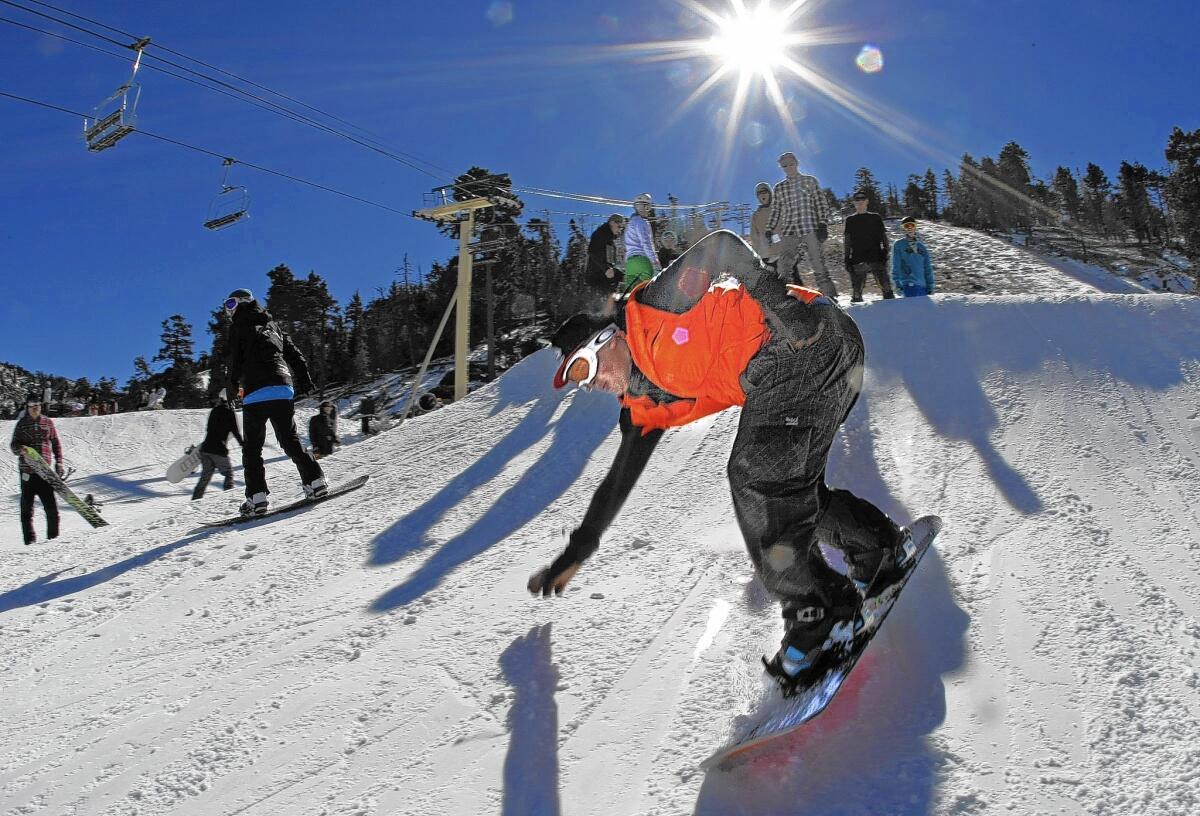Mammoth Mountain owner buys Bear Mountain and Snow Summit

- Share via
The operators of the Mammoth Mountain ski resort, one of the nation’s most popular snow destinations, have signed a $38-million deal to acquire the Bear Mountain and Snow Summit resorts near Big Bear Lake in the San Bernardino Mountains.
The move, which comes in the midst of a historic drought, puts Mammoth Mountain in control of more than 4,000 acres of skiable land in California, visited by about 2 million skiers and snowboarders a year.
“My father used to say in business you want to do the opposite of what everyone else is doing,” said Rusty Gregory, chief executive of Mammoth Mountain. “This does look like a questionable time to buy a ski resort operation.”
Still, the slopes may not be the main focus of the deal. Mammoth Mountain’s biggest investors are resort developers who already have plans to build on the land around the newly acquired Southern California ski resorts. Bear Mountain and Snow Summit, about 100 miles east of Los Angeles, are operated by the Snow Summit Ski Corp.
The deal to buy Snow Summit Ski Corp. includes a golf course, a driving range and several parking lots — totaling 136 acres of private land — as well as rights to 438 acres of skiable land owned by the U.S. Forest Service.
“In the next few months, expect announcements on developments and expansion plans for all four of our resorts,” Gregory said, referring to Mammoth Mountain; its smaller sister resort in the Sierra, June Mountain; plus Bear Mountain and Snow Summit in Southern California.
Such construction plans should come as no surprise.
Since Mammoth Mountain’s founder Dave McCoy sold his controlling interest in his resort in the Eastern Sierra to Connecticut-based Starwood Capital Group in 2005, the company has invested heavily to add upscale hotels, condominiums, shops and eateries around Mammoth Lakes, the rustic town at the base of the mountain.
Locals at Mammoth Lakes have groused that the development has changed the homey feel of the resort town. But Gregory said any development around Bear Mountain and Snow Summit will keep the local “vibe and culture.”
“We have a very good understanding of the Bear Mountain and Snow Summit market,” he said.
Snow Summit began as the dream of snow enthusiast Tommi Tyndall and his family in the early 1950s. Over the next few decades, the family expanded the resort from a single, mile-long chair lift to the most popular ski resort in Southern California. Tyndall’s wife, Jo, and his stepson Richard Kun eventually took over the operation after Tyndall’s death in 1964.
In 2002, Snow Summit bought out its neighbor and biggest competitor, Big Bear Resorts. The two resorts are two miles apart, overlooking Big Bear Lake.
Snow Summit announced in June 2013 that it had hired international banking firm Houlihan Lokey to look for buyers because several shareholders wanted to liquidate their interests, Kun told a local newspaper.
The purchase by Mammoth Mountain follows a consolidation trend in the ski industry that has put some of the nation’s most popular mountains in the control of a handful of large resort developers.
The trend has been evident around Lake Tahoe, where Vail Resorts Inc., operator of Heavenly Mountain Resort, acquired the Northstar-at-Tahoe resort near the lake’s North Shore in 2010.
The following year, Squaw Valley USA and Alpine Meadows, two of the largest ski resorts at Lake Tahoe, combined operations.
Bob Roberts, executive director of the California Ski Industry Assn., said the consolidation trend reflects the industry’s efforts to make profits at a the time of unreliable snowfall.
“The law of life has changed,” he said. “We are dealing with a climate-change market.”
Last winter, snowpack levels dropped to about 15% of the season average and reduced skier visitation numbers statewide as much as 45% compared with the previous season.
One way ski resorts hope to generate profits when snow is scarce is to develop year-round recreation activities, such as mountain bike trails, zip lines and concerts on the slopes.
“Consolidation is allowing larger resorts to rethink the mountain recreation business,” Roberts said.
Alan Reay, an expert on the hotel industry and president of the Atlas Hospitality Group, said the deal could bring Big Bear Lake the infusion of capital it needs to draw overnight visitors from throughout the region.
“Anything that they can do to have more development in the area ... that’s going to be positive,” he said.
The deal should also be good news for skiers and snowboarders, Gregory said.
Mammoth Mountain plans to begin this weekend to sell an annual pass that gives snow enthusiasts access to Mammoth Mountain and June Mountain, plus Bear Mountain and Snow Summit, for $689, he said. That’s the same price that Mammoth Mountain charged for its annual pass last year.
Skiers and snowboarders who have already bought the Mammoth Mountain pass for this coming season will be allowed to use the pass at Bear Mountain and Snow Summit, Gregory said.
More to Read
Inside the business of entertainment
The Wide Shot brings you news, analysis and insights on everything from streaming wars to production — and what it all means for the future.
You may occasionally receive promotional content from the Los Angeles Times.










